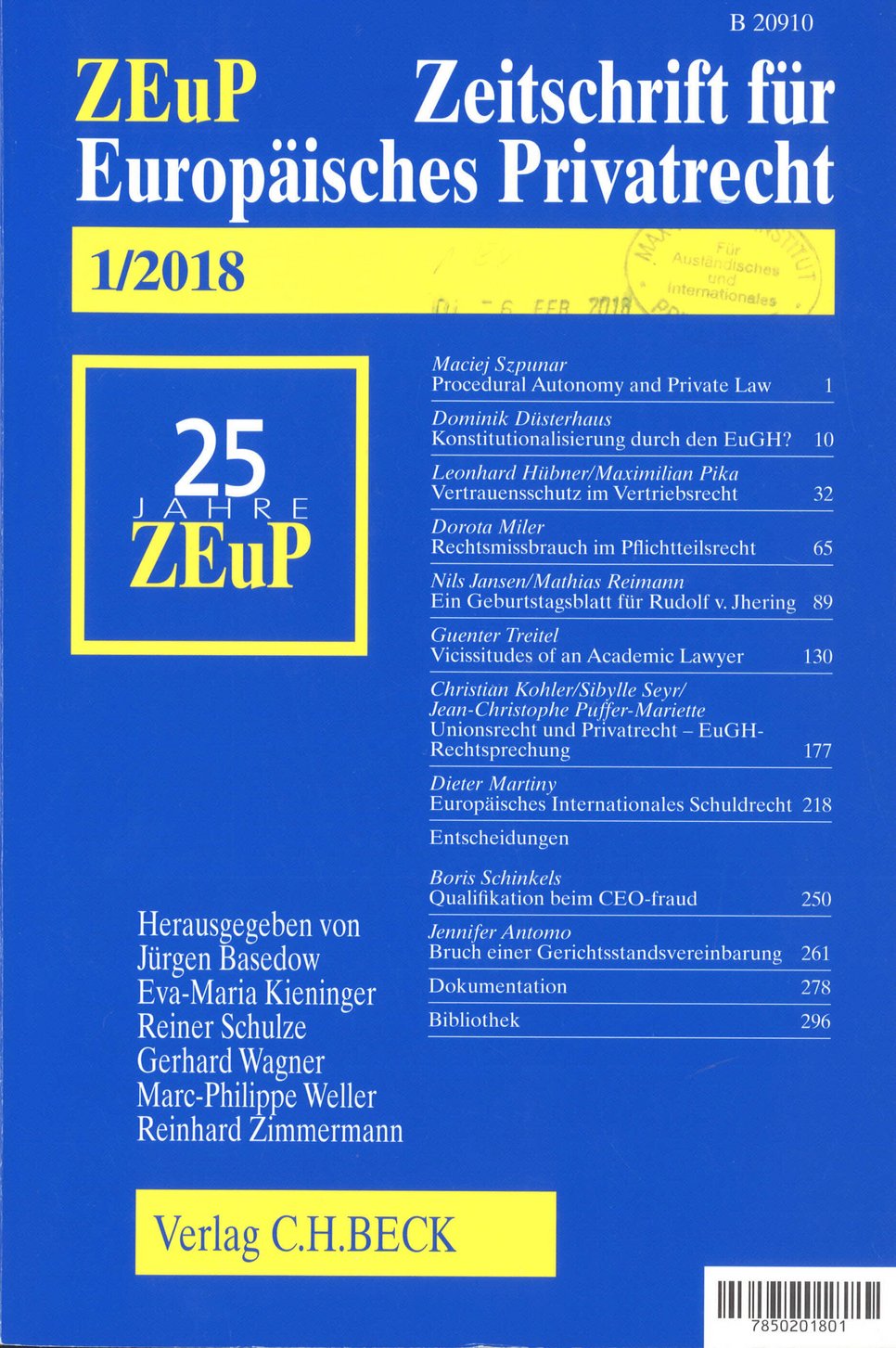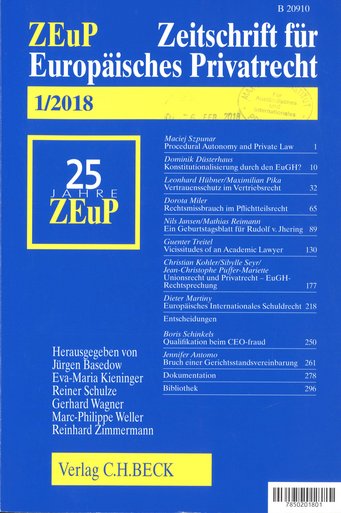
Quite European – How the Institute accompanies the development of law in Europe
On Europe Day, held annually on 9 May, the European Union celebrates peace and unity in Europe. As its basic foundation, this harmony rests on a close cooperation practised between nations. In the area of private law, however, the law of the individual Member States is not unified, meaning that different legal systems will frequently confront one another in matters involving cross-border commercial relations, multinational financial firms or international family relationships. With this in mind, there have since the 1980s been efforts to develop a uniform body of private law for Europe. A particular focus in this regard has been the area of contract law, a project that has for the time being been side-lined.
The scholars of the Max Planck Institute for Comparative and International Private Law have assumed the task of studying Europe‘s economic and legal challenges and critically accompanying the development of European law.
Commentaries on European Contract Laws

Over the course of the past forty years, a number of drafts for European contract law have been prepared, ranging from the Principles of European Contract Law via the Draft Common Frame of Reference to the Common European Sales Law. Then there are the European Directives in the area of consumer contracts, documents such as the UNIDROIT Principles of International Commercial Contracts aiming at the global harmonization of law, and a number of other texts. Now that the European Commission has, for the time being, abandoned its attempt to codify European contract law, there is a good moment for scholars to take stock of the situation and to provide orientation. This is what a foundational work edited by Reinhard Zimmermann and Nils Jansen aims to do. The book, which will be published by Oxford University Press this summer, is the product of a cooperation of twenty authors, the vast majority of whom have worked under the academic guidance of one of the two editors. Entitled “Commentaries on European Contract Laws”, it provides rule-by-rule commentaries on the various layers of European contract law and it assesses them against their historical and comparative background. The Principles of European Contract Law, supplemented by the legal rules contained in the European Directives, constitute the hermeneutic starting point and framework for this analysis. The questions posed include to what extent the modern model rules can indeed be understood as manifestations of a European common core. The book also shows what direction should be taken in the further development of European contract law.
EU-wide bank account preservation

Up to now, smart debtors have been able to easily evade bank account attachment by closing a bank account in one EU Member State and opening a new one in another. The Member States’ very differently designed enforcement systems make it difficult for creditors to recover their claims across borders. The European Account Preservation Order (Regulation No 655/2014) establishes, alongside the Member States’ enforcement procedures, an EU-wide unified system for the attachment of bank accounts. This procedure does not lead to the settling of claims, but does prevent the debtor from withdrawing or transferring money. Dr. Denise Wiedemann addressed this Regulation in the “EuZPR-EuIPR-Kommentar” volume of commentary on European private international law (Sellier, 4th edition 2015). Now she is examining the Regulation’s initial practical consequences since it took effect on 28 January 2017.
EU-law and family law

Samuel Fulli-Lemaire’s main area of research is family law, which is not one that immediately springs to mind when the phrase “EU law” is mentioned. As is often said, the EU has no competence in family law. This, however, is misleading: most of the rules which apply to cross-border family cases – the so-called private international law rules – can now be found in various EU Regulations and, as such, are European. Even in those areas where the EU really does lack competence, the freedom of movement guaranteed to EU citizens by article 21 TFEU must be respected. Can it really be the case that a same-sex couple discovers, upon moving from their home Member State to another, that their marriage ceases to be valid because their new host country does not recognize such a union? Because the rules adopted regarding cross-border cases can influence and shape subsequent reforms in national law, these issues are at the heart of family law scholarship.
25 Years of the “Zeitschrift für Europäisches Privatrecht”

On 4 and 5 May 2018, the Max Planck Institute for Comparative and International Private Law is hosting the academic symposium to the 25th anniversary of the Zeitschrift für Europäisches Privatrecht. The topic of the two-day meeting is the new orientation of European private law. Among other elements, featured speakers will address the consequences of Brexit for English and European private law as well as the extension of European private law to non-EU countries.
The Zeitschrift für Europäisches Privatrecht (ZEuP) was founded in 1993 and has grown into a leading international forum – extending beyond German-speaking regions – for discussing the Europeanization of private law and private law scholarship. Published quarterly, the ZEuP considers fundamental aspects and current developments in respect of EU private law, comparative law, legal history, the unification of laws, private international law and individual European regimes of private law. The journal is edited by Jürgen Basedow, Emeritus Director at the Institute, Reinhard Zimmermann, Director at the Institute, Eva-Maria Kieninger, Reiner Schulze, Gerhard Wagner and Marc-Philippe Weller.
Handwörterbuch des Europäischen Privatrechts

The body of European law that has developed in the last twenty years is fragmentary and does not follow an overarching concept. In response to these developments, the Max Planck Institute for Comparative and International Private Law published the Handwörterbuch des Europäischen Privatrechts in 2009. With its structured keyword entries, the Handwörterbuch creates a foundation for the systematization of European private law. Considering the historical and comparative dimensions, the keyword entries explore current developments and future harmonization projects for all areas of private law. In terms of both its scope, its methodology and its systematic approach, the Handwörterbuch remains a unique resource which makes valuable information available to legal scholars and legal practitioners in a condensed and readily accessible format.
















